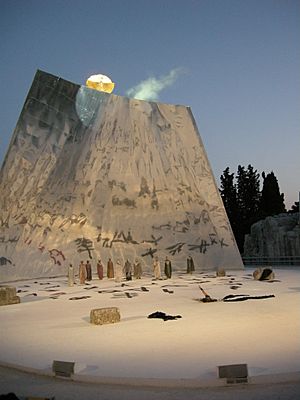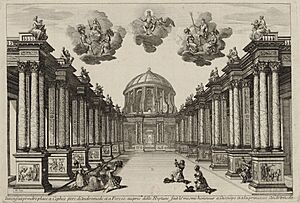Deus ex machina facts for kids
Deus ex machina (say "DAY-us ex MAH-kin-uh") is a Latin phrase that means "god from the machine." It's a special trick used in stories, plays, or movies. It happens when a really big problem, one that seems impossible to fix, suddenly gets solved by something unexpected and unlikely. This can be a surprise for the audience, lead to a happy ending, or even be used for comedy.
Contents
What Does Deus ex Machina Mean?
The phrase Deus ex machina comes from ancient Greek theater. Back then, actors playing gods would be lowered onto the stage using a special crane (called a mechane). Sometimes, they would come up through a trapdoor. This was how a "god from the machine" would appear to solve the problems in the play.
The ancient Greek writer Aeschylus first used this idea. It became very popular, especially with another writer named Euripides. He used it often to end his plays and solve the main conflict. Even though it was mostly used in serious plays (tragedies), it also appeared in funny plays (comedies).
Old Examples from Plays
Euripides used deus ex machina in many of his plays. A famous example is his play Medea. In this story, Medea needs to escape from her husband, Jason. Suddenly, a chariot pulled by dragons appears. It was sent by the sun god Helios to carry Medea to safety.
Another example is in Euripides' play Alcestis. The main character, Alcestis, agrees to die so her husband can live. But at the end, the hero Heracles shows up. He takes Alcestis away from Death and brings her back to life, reuniting her with her husband.
The Greek audience loved seeing the gods appear this way. It made them feel amazed and added to the play's message.
Modern Examples in Theater
Even famous writers like Shakespeare used this trick. You can see it in his plays like As You Like It and Cymbeline.
Later, in the 17th and 18th centuries, writers sometimes used deus ex machina to make difficult ideas more acceptable to powerful people. For example, in Molière's play Tartuffe, the heroes are saved by an agent of the King. This was a way to show the King as kind and powerful, especially since the King had a lot of control over Molière's work.
Deus ex Machina as a Story Trick
The ancient Greek thinker Aristotle was one of the first to talk about deus ex machina as a way to end a story. He thought it was not always a good thing to use. Many people today agree. They say it can make a story feel less believable. It might seem like the writer couldn't think of a better way to solve the problem. This can make readers or viewers stop believing in the story's world.
Examples in Books and Movies
- Avengers: Endgame: In this movie, the heroes need to travel through time to fix things. The writers said they used time travel because they had created a very difficult situation in the previous movie. Also, some people think Captain Marvel arriving suddenly at the end of the film is like a deus ex machina. Her powers are so strong that her arrival makes the problem too easy to solve.
- The Lord of the Rings: In J. R. R. Tolkien's books, the Great Eagles rescue Frodo and Samwise from Mordor. Some critics say this is a deus ex machina because it's a very sudden and powerful rescue.
- Lord of the Flies: At the end of this book, a navy officer suddenly arrives and saves the children who are stranded on an island. The author, William Golding, called this a "gimmick." It shows how terrible things would have become if the officer hadn't appeared right then.
- Oliver Twist: In this story by Charles Dickens, a character named Rose Maylie turns out to be Oliver's long-lost aunt. This discovery helps Oliver live happily with his kind helper, Mr. Brownlow. It's a very convenient and unexpected solution to his problems.
- The War of the Worlds: In H. G. Wells's novel, giant Martians have destroyed everything and seem to have won. But then, they are suddenly killed by tiny bacteria. This unexpected event saves humanity when all hope seemed lost.
See also
 In Spanish: Deus ex machina para niños
In Spanish: Deus ex machina para niños
 | Kyle Baker |
 | Joseph Yoakum |
 | Laura Wheeler Waring |
 | Henry Ossawa Tanner |



